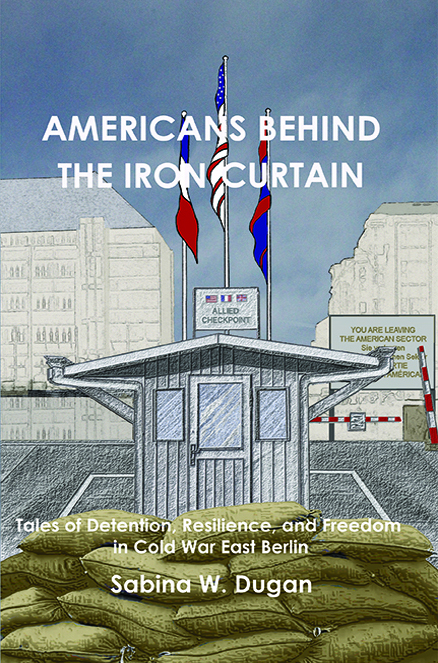
About the Author
Sabina W. Dugan is an historian and historic preservationist in the Washington, DC area, specializing in German American history. During her tenure at the Smithsonian Institution, she collaborated on a transatlantic research project on the German-born architect Adolf Cluss and his affiliation with Karl Marx, culminating in an exhibition and book publication. She has a BA from the University of Colorado and a MS from the University of Vermont.
AMERICANS BEHIND THE IRON CURTAIN: Tales of Detention, Resilience, and Freedom in Cold War East Berlin
Sabina W. Dugan, New Academia Publishing/VELLUM 2024
144 pages
ISBN 979-8-9875893-9-7 paperback
 See an excerpt from the book.
See an excerpt from the book.
For BULK ORDERS, order directly from New Academia Publishing.
Queries: orders@newacademia.com
About the Author
Sabina W. Dugan is an historian and historic preservationist in the Washington, DC area, specializing in German American history. During her tenure at the Smithsonian Institution, she collaborated on a transatlantic research project on the German-born architect Adolf Cluss and his affiliation with Karl Marx, culminating in an exhibition and book publication. She has a BA from the University of Colorado and a MS from the University of Vermont.
AMERICANS BEHIND THE IRON CURTAIN: Tales of Detention, Resilience, and Freedom in Cold War East Berlin
Americans Behind the Iron Curtain is a story of endurance, suffering, patriotism, and cunning tactics during the Cold War, when the city consisted of two political systems, two cultures and two conflicting ideologies. It relates what happened to seven American political prisoners in East Berlin during the mid-to-late 1960s, one of whom was the author’s own father. Their idealistic motives as well as their fate at the hands of the Stasi is described in detail. The nuanced negotiations between East and West reveal motives and resistance on behalf of both countries. When official channels of negotiations failed, a New York lawyer with ties to the White House accepted the challenge. Maxwell M. Rabb, who was also President of the American Committee for Refugees, took charge without an official mandate, paid his own expenses, and ultimately succeeded in negotiating the release of the prisoners. Using newly unclassified material, unpublished materials, and personal interviews, the author offers readers new insight into the process of prisoner negotiations between East and West during the Cold War. With its detailed accounting of the fate of American prisoners held in Stasi prisons, this book expands on the knowledge of Cold War diplomacy in Berlin during the 1960s.
Praise
“I find this micro-history of US-GDR “hostage diplomacy” in the Cold War to be original, well-researched in its primary sources, and provocative. It is also timely, given the recent resurgence of US-Russia hostage diplomacy. Dugan’s book illuminates the idealism and naiveté of young Americans in the 1960s trying to preserve what they saw of value in German culture and also to aid Germans who wanted to leave the GDR, not fully understanding the consequences to themselves until they were arrested.” —Denise J Youngblood, PhD, Professor of History Emerita, University of Vermont
“Striking and of central importance for the history of the GDR is how, in addition to the GDR’s overarching and consistent quest for international recognition, economic and trade problems played an outstanding role. Overall, this book expands our knowledge of the Cold War in and around Berlin in the 1960s for both an American and a German audience.” — Dr. Dieter Dowe, Retired Professor, Technical University Braunschweig, and former director of the Historical Research Center at the Friedrich Ebert Stiftung, Bonn





 Coming Soon
Coming Soon Awards
Awards